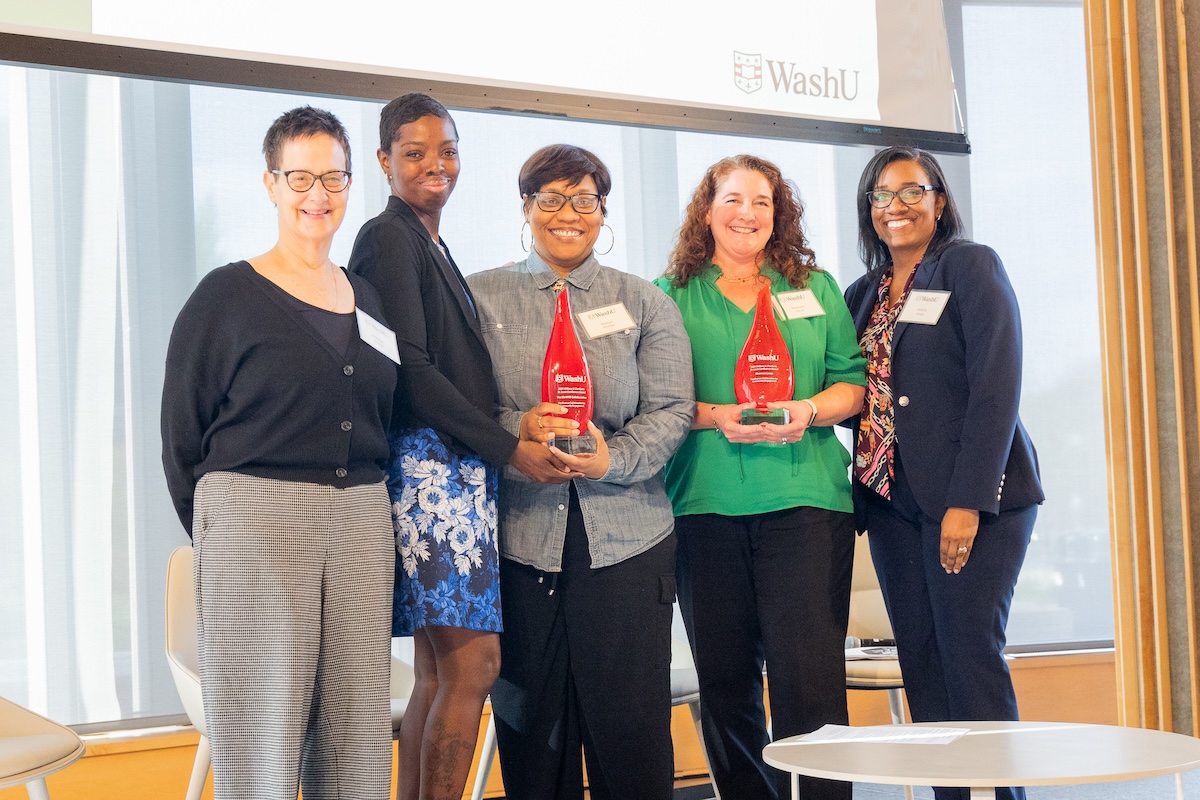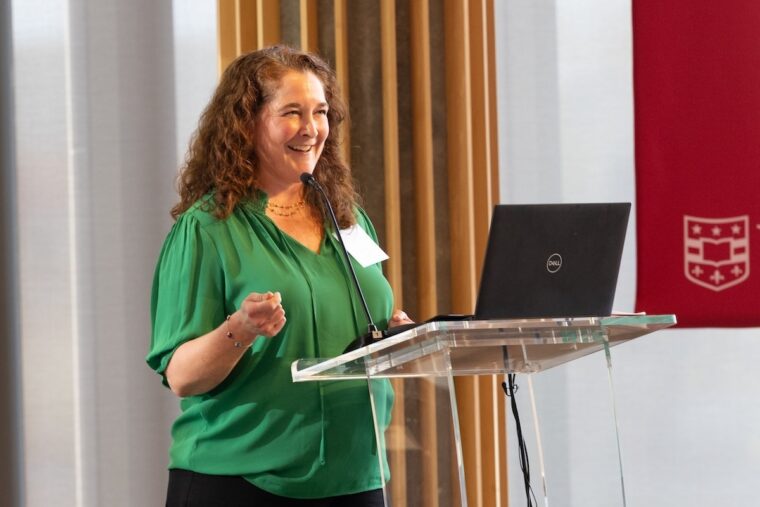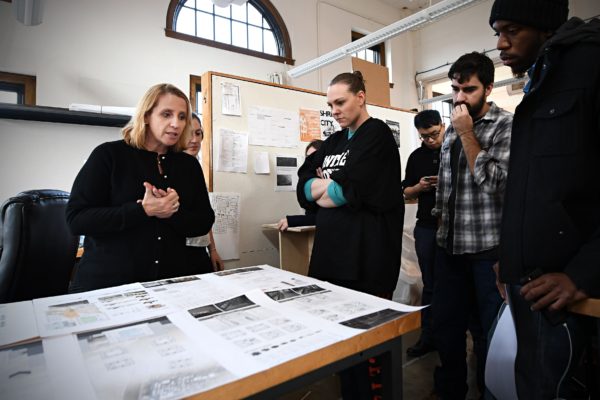Shannon Lenze, an associate professor of psychiatry at Washington University School of Medicine in St. Louis, knows the grim statistics showing that gun violence, racism, poverty and a lack of access to transportation and nutritious foods can adversely affect mental and physical health during pregnancy, particularly among Black people who suffer disproportionately more than those of other races.
However, Lenze noted that many obstetricians hesitated to question pregnant patients about trauma related to their life experiences because it could upset them. Through her partnership with Elevating Voices, Addressing Depression, Toxic Stress and Equity (EleVATE), a community of academic physicians and clinics in St. Louis, Lenze had a light bulb moment — one that has helped guide her research on prenatal health of the pregnant person and baby.
“Just because you don’t ask us about our trauma doesn’t mean it didn’t happen,” a postpartum woman explained during a 2018 meeting with EleVATE, a collaborative that includes community-based health care organizations, practicing obstetricians and academic scientists, and women who have been pregnant who serve as community representatives.
“And if you ask us about it,” the pregnant woman continued, “we feel safe because we know you sincerely care about us.”
The revelation has led to pregnancy research and initiatives rooted in trauma-based care. One example includes a prenatal care group in which participants learn healthy habits, bond with one another and discuss their experiences with ongoing adversity.
For their efforts at improving maternal and infant health outcomes, Lenze and EleVATE collaborators received WashU’s William H. Danforth St. Louis Confluence Award, which recognizes researchers and community partners who work together to address regional problems.
The award is named after former WashU Chancellor William H. Danforth, credited with strengthening ties between the university and St. Louis during his tenure from the 1970s through the 1990s.
“Collaborating deeply with people in the St. Louis region and listening to their needs and perspectives are essential to all that we do at WashU, whether in education, research or patient care,” said Beverly Wendland, provost and executive vice chancellor for academic affairs. “Merging the talent of our researchers with the lived experiences of St. Louisans can have a tangible impact on society’s biggest challenges.”
Maternal and infant health outcomes in both St. Louis and St. Louis County rank the worst among U.S. metros, according to federal data. The nation’s preterm birth rate — meaning babies born before 37 weeks of pregnancy — is 10.4% of live births. By comparison, St. Louis’ preterm birth rate is 13.5% of live births and St. Louis County’s is nearly 12% of live births. Babies born prematurely are at a higher risk for health problems such as developmental delays, disability and death.
A pilot study, co-led by Lenze and published last year in the journal Health Equity, showed the prenatal care group can help to reduce preterm deliveries and improve mental health, the leading cause of pregnancy-related death in the St. Louis region. The care model is now being evaluated in a randomized, controlled clinical trial.
Lenze also cited a recent study from another institution that found rates of postpartum depression increased by 140% in non-Hispanic Black women over the past decade. Additionally, Black pregnant patients — independent of socioeconomic or education status — are at increased risk for adverse pregnancy outcomes than other racial or ethnic groups. They are also three times more likely to die during childbirth than white patients.
Risk factors vary, but mental health, racism and daily stress can contribute to preterm births. “Year after year, rates of preterm births in the St. Louis region have been atrocious,” Lenze said. “EleVATE’s emphasis on community collaboration has allowed us to have serious, honest conversations about the obstacles pregnant patients face and ways health care workers can support them. Receiving the Confluence Award would be impossible without EleVATE’s community collaborators. Together, we hope to impact health care teams and systems in the St. Louis region.”
Sharing the award is Cheron Phillips, a community collaborator at EleVATE who participated in the pilot study when she was pregnant. “I used to wonder if anyone cared enough to listen to the community voice,” she said. “This award signifies that my voice and the voices of other birthing families are being heard.”
Lenze, Phillips and other EleVATE collaborators accepted the award at the William H. Danforth St. Louis Confluence Award Showcase April 16 at Hillman Hall on the Danforth Campus.
The event was hosted by the Confluence Collaborative for Community-Engaged Research, Teaching and Practice, established in 2024 to support the St. Louis community and community-engaged research.
In addition to a presentation about the EleVATE research, the ceremony included recognition for the 2025 Provost Impact Award winners. They are:
- “Empowering Young Women Through Breast Health Education: A Partnership with Siteman Cancer Center and Hazelwood School District” (Faculty lead: Lannis Hall, WashU Medicine; Community lead: Nettie Collins-Hart, Hazelwood School District)
- “Improving Postpartum Mental Health for NICU Families: Developing and Piloting ‘The Fathers First Initiative’ in Neonatal Healthcare Systems” (Faculty lead: Tyriesa Howard, Brown School; Community lead: Jessie A. Davis, Integrated Health Network)
- “Segregation By Design” (Faculty lead: Catalina Freixas, Sam Fox School of Design & Visual Arts; Community lead: St. Louis Association of Community Organizations)
- “STL Solid Waste and Alley Condition Project” (Faculty lead: Scott Krummenacher, Arts & Sciences; Community lead: Karisa Gilman-Hernandez, Dutchtown South Community Corp.)
- “The Importance of Cost Transparency During Cancer Care” (Faculty lead: Mary Politi, School of Public Health; Community lead: Center for Collaborative Care Decisions community advisory board)
2025 honorable mentions
- “A Community Partnership to Enhance Sexual Health Care” (Faculty lead: Hilary Reno, WashU Medicine; Community lead: St. Louis Sexual Health Community Member Advisory Board)
- “Building Bridges: Advancing Refugee Integration in St. Louis” (Faculty lead: Mitra Naseh, Brown School; Community leads: Monarch Immigrant Services and International Institute of St. Louis)
- “CHEST: A Collaboration with Community Health Centers to Implement SMART for Asthma” (Faculty lead: James Krings, WashU Medicine; Community lead: Andwele Jolly, Integrated Health Network)
- “Developing a Community-Based Interdisciplinary Collaborative Team to Support School-Aged Youth with Asthma” (Faculty lead: Kelly Harris, WashU Medicine; Community lead: Veronica Macklin, Hazelwood School District)
- “Financial Burden Among Black Men Making Prostate Cancer Treatment Choices” (Faculty lead: Ashley Housten, WashU Medicine; Community lead: the Empowerment Network)

At the Confluence Award ceremony, attendees Becky Hassler (left), Richelle Smith, Cheron Phillips, Shannon Lenze and Bettina Drake celebrate.
Originally published on the WashU Medicine website



